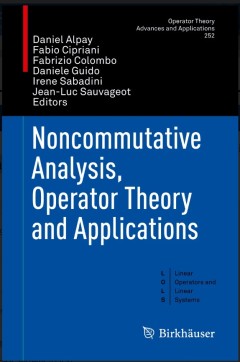Filter by

The Sugarcane Complex in Brazil The Role of Innovation in a Dynamic Sector o…
This book offers an in-depth analysis of the Brazilian sugarcane complex with a special focus on technological advances that promote sustainable development. It first examines the question why sugarcane-based ethanol from Brazil is considered a superior alternative to fossil fuel compared to other biofuels produced on an industrial scale and subsequently analyzes the most dynamic areas within t…
- Edition
- -
- ISBN/ISSN
- 978-3-319-16583-7
- Collation
- -
- Series Title
- -
- Call Number
- -

Operator Theory
A one-sentence definition of operator theory could be: The study of (linear) continuous operations between topological vector spaces, these being in general (but not exclusively) Fréchet, Banach, or Hilbert spaces (or their duals). Operator theory is thus a very wide field, with numerous facets, both applied and theoretical. There are deep connections with complex analysis, functional analysis…
- Edition
- 1
- ISBN/ISSN
- 978-3-0348-0666-4
- Collation
- XIX, 1860
- Series Title
- -
- Call Number
- -

Rural-Urban Interaction in the Developing World
Sustaining the rural and urban populations of the developing world has been identified as a key global challenge for the twenty-first century. Rural-Urban Interaction in the Developing World is an introduction to the relationships between rural and urban places in the developing world and shows that not all their aspects are as obvious as migration from country to city. There is now a growing r…
- Edition
- -
- ISBN/ISSN
- 9780203646274
- Collation
- -
- Series Title
- -
- Call Number
- -

Africa in International Politics External Involvement on the Continent
Locating Africa on the global stage, this book examines and compares external involvement in the continent, exploring the foreign policies of major states and international organizations towards Africa. The contributors work within a political economy framework in order to study how these powers have attempted to stimulate democracy, peace and prosperity in the context of neo-liberal hegemony a…
- Edition
- -
- ISBN/ISSN
- 9780203493175
- Collation
- -
- Series Title
- -
- Call Number
- -

Africa and the North Between Globalization and Marginalization
An important new discussion of Africa's place in the international system. This volume discusses Africa's place in the international system, examining the way in which the Westphalian system, in light of the impact of globalization and transnational networks, continues to play a major role in the structuring of Africa's international relations. The book provides a solid empirical analysis…
- Edition
- -
- ISBN/ISSN
- 9780203414484
- Collation
- -
- Series Title
- -
- Call Number
- -

Managing Development Globalization, Economic Restructuring and Social Policy
Globalization in the 1990s provided both opportunities and challenges for developing and transition economies. Though for some, it offered the chance to achieve economic growth through active involvement in the integrated and liberalized world economy, it also increased their vulnerability to external shocks and volatility. As a consequence, stakeholders at every level of the development and…
- Edition
- -
- ISBN/ISSN
- 9780203015292
- Collation
- -
- Series Title
- -
- Call Number
- -

Noncommutative Analysis, Operator Theory and Applications
This book illustrates several aspects of the current research activity in operator theory, operator algebras and applications in various areas of mathematics and mathematical physics. It is addressed to specialists but also to graduate students in several fields including global analysis, Schur analysis, complex analysis, C*-algebras, noncommutative geometry, operator algebras, operator theory …
- Edition
- 1
- ISBN/ISSN
- 0255-0156
- Collation
- VII, 283
- Series Title
- Operator Theory: Advances and Applications
- Call Number
- -

The Global and the Local: Diverse Perspectives in Comparative Education
The book examines how the understanding of the global and the local has changed in response to ongoing reconfigurations between the state and society. It also emphasizes the importance of schooling as an institution both within and across national contexts, a holistic approach that helps us move beyond a conglomeration of isolated local events to pay attention to global trends. In this regard, …
- Edition
- -
- ISBN/ISSN
- 978-9463006521
- Collation
- 15.6 x 0.92 x 23.4 cm
- Series Title
- -
- Call Number
- -

The Global Digital Divides
This book analyzes extensive data on the world’s rapidly changing and growing access to, use and geographies of information and communications technologies. It studies not only the spatial differences in technology usage worldwide, but also examines digital differences in the major world nations of China, India, the United States and Japan at the state and provincial levels. At the global lev…
- Edition
- -
- ISBN/ISSN
- 978-3662466018
- Collation
- 415 pages
- Series Title
- -
- Call Number
- -

Noether's Theorems:Applications in Mechanics and Field Theory
The book provides a detailed exposition of the calculus of variations on fibre bundles and graded manifolds. It presents applications in such area's as non-relativistic mechanics, gauge theory, gravitation theory and topological field theory with emphasis on energy and energy-momentum conservation laws. Within this general context the first and second Noether theorems are treated in the very g…
- Edition
- 1
- ISBN/ISSN
- 978-94-6239-170-3
- Collation
- XVII, 297
- Series Title
- Atlantis Studies in Variational Geometry
- Call Number
- -
 Computer Science, Information & General Works
Computer Science, Information & General Works  Philosophy & Psychology
Philosophy & Psychology  Religion
Religion  Social Sciences
Social Sciences  Language
Language  Pure Science
Pure Science  Applied Sciences
Applied Sciences  Art & Recreation
Art & Recreation  Literature
Literature  History & Geography
History & Geography